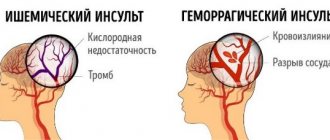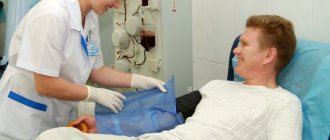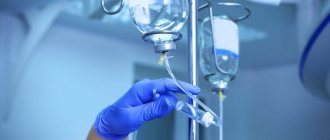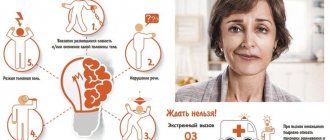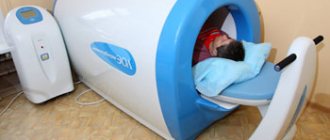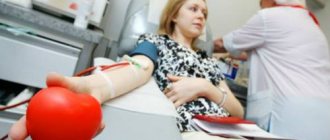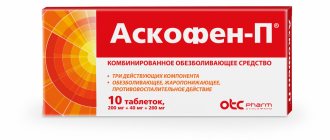How to lower blood pressure
Some women may experience both low and high blood pressure after childbirth. In most cases, healthy women during pregnancy, especially in the last stages, have low blood pressure. But this doesn't always happen.
High blood pressure may be observed in women after childbirth who suffered from this disease even before pregnancy; in such women, arterial hypertension is diagnosed before the 20th week of pregnancy; this pathology may also develop for the first time during pregnancy; as a rule, hypertension for the first time appears after the 20th week. And the third category of women detects an increase in blood pressure after childbirth for the first time, with normal blood pressure values before and during pregnancy.
Reasons for increased blood pressure after childbirth
Excess body weight
The cause of increased blood pressure in a woman after childbirth, who did not suffer from hypertension before pregnancy, can be neuropsychic stress, disruption of the regulatory systems of the higher centers of the nervous system, low physical fitness of the body, since childbirth is a kind of stress factor and a very energy-consuming process for the body. And if there are prerequisites for the development of hypertension, the disease can make itself felt. These prerequisites are:
- burdened heredity,
- drinking alcohol, smoking,
- excess body weight,
- overwork, lack of sleep.
The cause of high blood pressure after childbirth can be a hormonal imbalance in a woman’s body. Excess hormones affect blood vessels, which become spasmed under their influence, their tone increases, and peripheral resistance increases. The result is increased blood pressure.
Chronic pyelonephritis
Also, the stress on the body during childbirth and pregnancy can lead to exacerbation of chronic diseases that a woman suffers from, which can lead to the development of hypertension after childbirth. Conditions that can provoke increased blood pressure:
- diseases of the kidneys and kidney vessels (chronic pyelonephritis, glomerulonephritis, polycystic disease, kidney prolapse, renal vascular stenosis, kidney tumors that produce renin).
- endocrine disorders (diseases of the thyroid gland, adrenal glands, pituitary gland)
- vegetative-vascular dystonia
- diseases of the heart and blood vessels (angina pectoris, myocarditis, heart failure, atherosclerosis, arteritis)
- neuroses, postpartum depression
- taking certain medications (bromocriptine)
Dangers
High blood pressure poses a serious threat to the health of both mother and baby.
Hypertension is an increased tension in the intra-arterial blood flow, which provokes an increased load on the myocardium. After severe exhaustion during the period of bearing a child, the female body requires complete recovery. With increased blood pressure, the general condition of the female body does not improve or recover, but becomes even worse. This phenomenon contributes to the development of severe diseases of internal organs and systems, and loss of vision is also possible.
If measures are not taken in time to restore normal pressure, serious complications may develop in the body. Prominent among them are:
- severe headache that cannot be tolerated. This phenomenon requires drug treatment, which affects the quality of breast milk and can harm the baby.
- loss of consciousness. High blood pressure in women in labor is provoked by a strong load on the heart, which can provoke partial or complete loss of consciousness.
- pulmonary edema.
High pressure in the systemic circulation causes a malfunction of the pulmonary circulation, which leads to the lungs to saturate the blood with oxygen. Increased pulmonary pressure can cause pulmonary edema.
In unproblematic conditions, breastfeeding is the only source of nutrients for the baby. If the mother suffers from hypertension, this affects the quality of breast milk. Violation of blood pressure does not allow the mammary glands to be supplied with the required amount of blood, which leads to inadequate filling of milk with the required substances. This situation does not allow the baby to eat normally.
Symptoms of hypertension after childbirth
Headache
Women complain of headaches of varying intensity and character; it can be bursting, pressing, paroxysmal, most often in the temporal and occipital regions. Worry about attacks of dizziness, darkening of the eyes, decreased vision, and episodes of nausea may occur. Symptoms of hypertension may include shortness of breath with little physical exertion or at rest, chest pain, irregular heartbeat, or rapid heartbeat.
All symptoms are in one way or another associated with an increase in pressure numbers on the tonometer from 140/90 mmHg. and higher. If a woman was diagnosed with hypertension before pregnancy, then after childbirth its degree may increase and her health may worsen. If there was no such diagnosis before, the blood pressure increased during pregnancy and 42 days after birth the blood pressure numbers remain consistently high, then the doctor has every reason to make a diagnosis of new-onset hypertension.
High blood pressure before pregnancy
Under the supervision of doctors
Women with hypertension during pregnancy need to be observed not only by a gynecologist, but also by a cardiologist or therapist. Preventatively, such women are observed in a hospital setting three times: before the 12th week of pregnancy, in the period from 28 to 32 weeks, and 2-3 weeks before childbirth. These measures are carried out to carefully monitor the woman’s condition in order to avoid the development of complications: gestosis, premature birth, fetoplacental insufficiency.
The method of delivery is determined by a council of doctors. Medical supervision and rational antihypertensive therapy help prevent progression of hypertension in such women after childbirth. It becomes obvious that doctors recommend changing the treatment regimen for women with hypertension who take medications during pregnancy.
Because many blood pressure pills are contraindicated during pregnancy due to their side effects on the developing fetus. We can take the following medications: b-blockers, calcium antagonists, a2-adrenergic agonists. Indications for use, dosage and regimen are determined by the doctor individually.
How to lower blood pressure without medications
To lower blood pressure after childbirth, it is necessary to follow generally accepted recommendations for successful recovery of the body. These rules will help not only lower blood pressure, but also strengthen the general condition of the female body.
- Normalization of the nervous system. To do this, you need to rest more and experience good emotions. Rest includes a good night's sleep and doing what you love (hobbies). To relieve severe stress due to caring for the baby, the child’s father and relatives should be invited to help. And devote the free time to walking in the fresh air.
- Smoking and drinking alcohol are absolutely prohibited.
- You should not overeat. It is better to stick to frequent meals in small portions.
- It is necessary to rationalize the menu, exclude foods that cause high blood pressure after childbirth. You should avoid fried, fatty, very spicy and salty foods, sweet flour products, smoked foods and spices, carbonated water and coffee. To normalize blood pressure, you can increase the amount of fresh fruits and vegetables, oatmeal or buckwheat porridge in your diet, that is, enrich the menu with foods high in potassium, magnesium and vitamin C.
- You need to consume 2-3 liters. liquids per day to fully establish the drinking regime.
- You should avoid strenuous physical activity aimed at losing weight after childbirth. Such restoration of the figure can have an impact on the general condition of the body.
- Doctors recommend avoiding possible rushes of blood to the head. This happens when bending sharply. Therefore, even when changing shoes, it is better to ask loved ones for help.
- You should monitor your breathing. Inhalations and exhalations should be short.
To quickly get rid of hypertensive manifestations, the procedure for warming the limbs, which can be done at home, works well. To do this, you should put a heating pad on your shins, and take warm baths with mustard powder for your hands and feet.
It is important to understand that the condition of the baby depends on the health of the mother. Therefore, at the slightest unpleasant symptoms that can be caused by hypertension or concomitant diseases, you should contact a specialized physician to prescribe treatment.
Self-medication can cause negative complications in the postpartum period and harm the newborn.
High blood pressure during pregnancy
Gestational hypertension
It happens that the blood pressure of a woman with an initially normal blood pressure level increases after the 20th week of pregnancy. This is gestational hypertension. If this form of hypertension occurs, then the pressure should normalize within 42 days after birth. If a gestational form of hypertension is suspected, the woman should be further examined.
It is necessary to conduct general clinical blood and urine tests, examine 24-hour urine for protein, perform an ultrasound of the kidneys, an ECG, determine blood glucose, LBC, 24-hour blood pressure monitoring, do an echocardiogram, and examine the fundus. A complete examination will help establish the correct diagnosis, as well as start treatment on time. This will help avoid complications during pregnancy and childbirth, and will also prevent the development of hypertension after childbirth.
Hypertension due to endometritis
In some cases, increased blood pressure occurs due to postoperative endometritis. A complication occurs if microbes and viruses enter the uterine cavity during childbirth. The main symptoms, in addition to increased blood pressure, are:
- a sharp increase in temperature up to 39 degrees;
- aching pain in the lower abdomen, in some cases it can be cutting;
- severe tachycardia;
- the appearance of brown purulent discharge;
- sleep problems.
Women who are suspected of having endometritis are re-examined with ultrasound. Antibiotics are prescribed and feeding is stopped during treatment.
High blood pressure after childbirth
Causes of high blood pressure after childbirth
But if, after 40 days after birth, the pressure continues to remain high, or begins to increase after the birth of the baby at normal levels during pregnancy, then postpartum hypertension occurs. Sometimes it develops due to the fact that a woman takes a drug that reduces lactation (milk production by the mammary glands) - bromocriptine. It helps increase blood pressure. Breastfeeding itself does not affect blood pressure numbers.
Some women refuse breastfeeding, citing the fact that breastfeeding increases blood pressure. This is wrong. Drugs aimed at reducing lactation at the end of breastfeeding increase blood pressure. If your doctor has recommended you take medications that lower blood pressure, you need to tell him that your baby is breastfed, since many blood pressure pills pass into breast milk.
The danger of hypertension before childbirth
High blood pressure before childbirth is a signal that a pregnant woman is developing gestosis, a type of toxicosis that causes swelling and an increase in the level of protein in the urine. These factors affect the fetus - oxygen starvation occurs.
High blood pressure provokes premature birth, as placental abruption occurs. If a threat to the fetus is identified, the woman is placed in preservation, tests are carried out in a timely manner and the risk of complications is identified.
Increased blood pressure during pregnancy is a dangerous sign
Hypertension and hepatitis B
Breast-feeding
Even if a woman is diagnosed with hypertension and needs to take medications that lower blood pressure, breastfeeding cannot be stopped. You just need to select those drugs that have a low degree of penetration into breast milk. Acceptable medications for breastfeeding and high blood pressure after childbirth are: dopegit, verapamil, b-blockers.
Antihypertensive medications should be taken so that the feeding time does not coincide with the period when the concentration of the drug in the blood is maximum. It is recommended to take the medicine before feeding, when it has not yet entered the bloodstream. But the dosage, time and frequency of administration must be prescribed by a doctor. If a woman decides to complete breastfeeding and wants to use drugs that reduce lactation for this, she should remember that they increase blood pressure.
Hormonal imbalance
Preparing for pregnancy, the period of bearing a baby, childbirth, breastfeeding and further recovery are difficult for the female body due to constant hormonal “shocks”. An additional factor affecting the functioning of a woman’s own endocrine system is the use of hormonal drugs, which are often prescribed during pregnancy. These changes do not always go smoothly - the imbalance of hormones that occurs during this period can cause edema.
Hormonal levels affect vascular permeability. In particular, thyroid hormones play a major role here, as well as the ratio of sex hormones (estrogen and progesterone) and other body hormones.
Please note that hormonal imbalance may be accompanied by a general decrease in body tone. Women often complain of weakness, drowsiness, weight gain, tired legs, and constipation. The presence of these symptoms in addition to edema suggests that the hormonal levels of the young mother have not yet recovered.
What will help normalize blood pressure after childbirth?
Walk in the fresh air
To return blood pressure readings to the original values that were observed before childbirth, a woman needs:
- First of all, you need to rest more, sleep at night, avoid stress, and experience positive emotions. Think about your hobbies before pregnancy, and in your free time do what brings you joy. It is necessary to involve the child’s father or close relatives to help with the newborn baby. Rest and sleep will have a beneficial effect on the recovery of your body.
- Walking in the fresh air for at least two hours a day is required.
- You cannot smoke or drink alcohol.
- Avoid overeating. Eat meals more often, but in smaller portions.
- You should exclude from your diet foods that increase blood pressure: fatty, fried, salty foods, spices, smoked foods, coffee, tea, soda. You should eat more foods low in cholesterol, high in potassium and magnesium - black bread with bran, oatmeal, buckwheat porridge, rose hips, bananas, other fruits and vegetables, foods containing high amounts of vitamin C.
- You should not exhaust yourself with excessive physical exertion to restore your figure; in the first time after childbirth, such exercise can adversely affect blood pressure, physical activity should be dosed, without overexertion, do morning exercises, go swimming
If you cannot normalize your blood pressure using the above methods, you should not delay going to the doctor. Correctly selected treatment will help you recover faster after childbirth and find the happiness of motherhood.
Is high blood pressure related to hormonal imbalance due to pregnancy and childbirth?
The female body is rebuilt from the first day of conception; after childbirth, not only the menstrual cycle, but also other functions do not return to normal immediately. However, a hormonal imbalance does not cause an increase in blood pressure or surges if it does not affect the psychosomatic state. Reasons for visiting a doctor after childbirth, in addition to high blood pressure, are:
- unmotivated increase in body weight (if a woman does not limit herself in nutrition, then this factor is not so obvious);
- manifestation of signs of virilization - hair growth begins according to the male type (dark hair on the stomach, face);
- there is spotting discharge not during menstruation;
- sudden surges in blood pressure accompanied by severe headaches;
- constant drowsiness and fatigue.
These symptoms may indicate the presence of hormonal imbalance after childbirth. Hormonal levels will not return to normal on their own; you need to contact a specialist.
An increase in blood pressure cannot be attributed to changes in the body. If symptoms persist for more than a few weeks, you should consult a physician. He will refer you for examination to an endocrinologist, cardiologist and neurologist. Experts will tell you what to do to ensure that the treatment is safe for the woman and her child.

